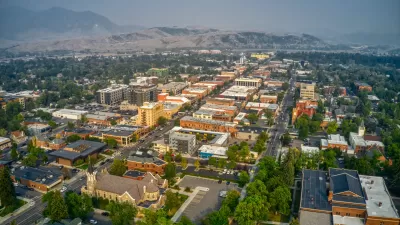The Ohio Department of Transportation is looking for feedback from the public on how best to expand services to meet growing demand despite an ongoing shortage of funding.
Alison Grant reports that the Ohio Department of Transportation (ODOT) is seeking public input "about the importance of public transit in the future of Ohio cities."
"It's conducting five regional meetings in October to hear from civic leaders and planners, and then will draft recommendations to better analyze and deliver services."
ODOT's role in the state's transportation system is, of course, critical. "Ohio supports a network of 28 urban and 33 rural transit systems. In 2012, Ohioans took 115 million trips using ODOT-funded public transit systems. Nine percent of Ohio households, or about 1 million Ohio residents, are without a car."
The meetings will help guide ODOT set long term goals for transportation despite funding levels that are among the lowest in the country.
FULL STORY: Public transit: Ohio funding that's among lowest in U.S. likely to arise at Tuesday ODOT forum

Planetizen Federal Action Tracker
A weekly monitor of how Trump’s orders and actions are impacting planners and planning in America.

Map: Where Senate Republicans Want to Sell Your Public Lands
For public land advocates, the Senate Republicans’ proposal to sell millions of acres of public land in the West is “the biggest fight of their careers.”

Restaurant Patios Were a Pandemic Win — Why Were They so Hard to Keep?
Social distancing requirements and changes in travel patterns prompted cities to pilot new uses for street and sidewalk space. Then it got complicated.

Platform Pilsner: Vancouver Transit Agency Releases... a Beer?
TransLink will receive a portion of every sale of the four-pack.

Toronto Weighs Cheaper Transit, Parking Hikes for Major Events
Special event rates would take effect during large festivals, sports games and concerts to ‘discourage driving, manage congestion and free up space for transit.”

Berlin to Consider Car-Free Zone Larger Than Manhattan
The area bound by the 22-mile Ringbahn would still allow 12 uses of a private automobile per year per person, and several other exemptions.
Urban Design for Planners 1: Software Tools
This six-course series explores essential urban design concepts using open source software and equips planners with the tools they need to participate fully in the urban design process.
Planning for Universal Design
Learn the tools for implementing Universal Design in planning regulations.
Heyer Gruel & Associates PA
JM Goldson LLC
Custer County Colorado
City of Camden Redevelopment Agency
City of Astoria
Transportation Research & Education Center (TREC) at Portland State University
Camden Redevelopment Agency
City of Claremont
Municipality of Princeton (NJ)





























